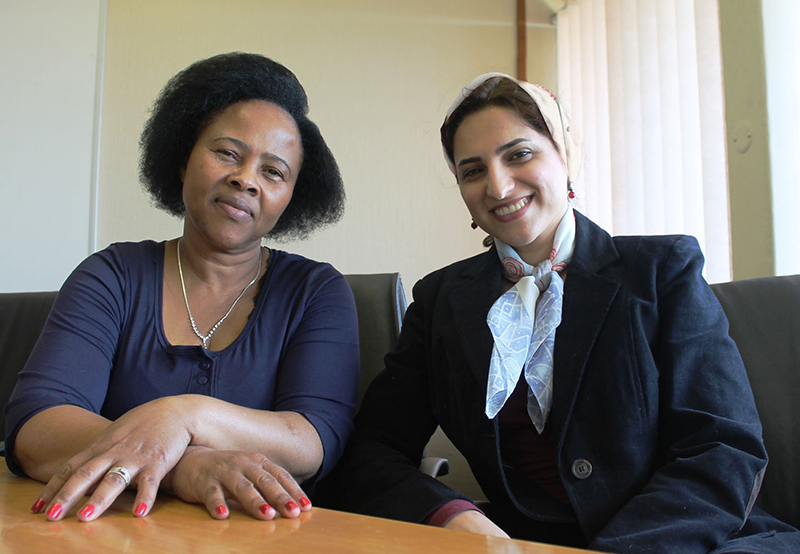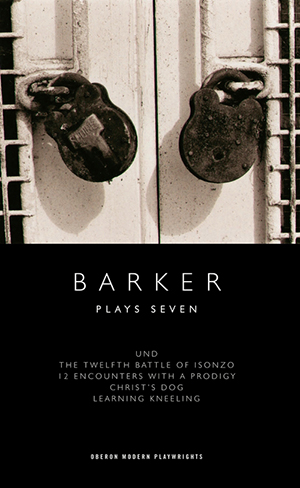News & Events
Iranian postgraduate student obtains Unisa PhD
Iranian Dr Mahboube Khalvati shares her unusual postgraduate study journey with the hope that it will inspire other Unisa students to undertake doctoral studies, but also to keep going if they have already started.

Pictured are Prof. Zodwa Motsa (Executive Director of the Department of Leadership and Transformation, Unisa) and Dr Mahboube Khalvati (Unisa PhD graduate in English Theatre Studies).
While the 35-year-old successfully completed her doctorate in English Theatre Studies, with a thesis entitled, Carnivalisation of catastrophe: a study of comedy in Howard Baker’s Theatre of Catastrophe, she explains it was not without challenges. “One of the main challenges that I had to overcome was scarcity of resources in Iran. It was really hard to find the books that I needed here. So, I had to ask my friends abroad to buy and post the books to me. I was lucky that some of the main references that I needed where available at the Unisa Library. The library services I received from Dawie Malan were perfect.”
Another challenge faced by Khalvati was the deterioration of her health, which she says held her back from submitting her research sooner. “There were times when I thought of quitting, but I am very glad that I did not. I am truly grateful to my supervisor, Professor Zodwa Motsa, who showed great understanding towards my situation and the obstacles I faced along the way. I thank her for her advice and trusting me with the topic. I am definitely more learned in the ways of the world and life, and I owe this to my PhD journey.”
Critical thinking, imagination and rage against compromise
Khalvati is a translator and interpreter by profession and has been working in the field for at least 15 years. She has translated texts on a variety of subjects including arts, especially music and literature in both academic and non-academic spaces. She has also presented at academic events locally and internationally. One of the major projects she is working on is the promotion of Persian literature to English-speaking audiences in the framework of the Persian Literature Review.
“I am very much interested in dramatic literature and especially contemporary British theatre, which has a variety of prominent prolific playwrights to offer,” she says. “Studying their plays in my undergraduate and master’s broadened my vision of what modern drama can offer.”

Image: Bloomsbury Publishing
Expanding on her PhD focus, Khalvati says she found Howard Barker a most interesting playwright who disapproved of the mainstream British theatre, offering possibilities that would have been otherwise neglected. However, she still had issues with some of his theories for which he had become famous. Consequently, to understand him better and to come to terms with her own thinking, she decided to choose this topic.
The African connection
Explaining how her research is important for South Africa and Africa, and how it aligns to Unisa’s vision of being the African university shaping futures in the service of humanity, Khalvati says: “A very crucial aspect of my research is highlighting Barker’s thoughts on the importance of critical thinking, imagination and his rage against ‘compromise’; valuing possibilities over certainties. His Theatre of Catastrophe is about putting forward possibilities and the rejection of ‘the time's cultural ideology’. Overgrowing catastrophes through bearing pain is essential to Barker’s theatre which I believe is a must for every society which aims at growth and improvement.”
Similarly, Professor Motsa, who is currently the Executive Director of the Department of Leadership and Transformation at Unisa, says that Khalvati’s research unlocks the space of comedy/laughter as entwined with tragedy, thereby functioning as a tool of dealing with intense human conditions. “Unisa’s vision,” she says, “is clearly evinced in Dr Khalvati exposing and interpolating the works of the 19th century Russian dramatist, Anton Chekhov, with that of Howard Barker, a 20th century English theatre maker. The blending and mixing of different cultural and historical milieus attest to the sameness of humanity. Therefore, the contribution made by this research is the exposé of the human condition and the ideal of serving humanity beyond the borders of culture, language and creed.”
Additionally, Professor Motsa explains that a doctorate adds value to the stature of any university, which is a knowledge production entity. “A doctorate also advances the national development plan in growing the graduate cohort of the country and the continent where the university is located,” she says. “Dr Khalvati’s research in theatre and the dramatic arts generates new theories in 21st century theatre. This is a high-quadrant sphere which shows the level of Unisa’s contribution to the production of new knowledge on the international stage.”
The importance of the arts as a study field
Professor Motsa highlights the importance of the arts as a study field in a multidisciplinary higher education institution.
She says: “The arts deals with the word and the human being; and therefore, central to the arts is the notion of ideas, thought and the human being. The Liberal Arts as an area of study is the ideal instrument to enable societies to reflect on their situations past and present – individual and collective – and thence to position themselves to assail or enjoy life. Through the arts, individual societies are able to map out how to handle their spatial positionalities among other communities of the world. Without the arts, we would not communicate our feelings and ideas, and we could never even express our disagreements.”
In closing, Khalvati advises students wishing to pursue their postgraduate studies to realistically evaluate their situation and then apply. “Postgrad studies are not only about degrees,” she says. “It has more of a make-or-break nature and, therefore, realistic goals and a strong support structure are important”. In this regard, she also thanked her family and South African friends whose support and assistance, she says, have been invaluable.
* By Rivonia Naidu-Hoffmeester
Publish date: 2021/04/16
